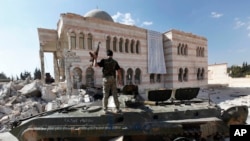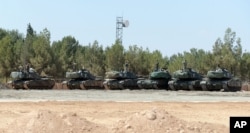The U.S.-supported, Turkish-backed Free Syrian Army (FSA) forces this week suffered a series of military setbacks to the Islamic State group in northern Syria, rekindling concerns over the effectiveness of the troops and whether that could force Ankara to deploy more of its own troops into Syria.
Since the start of its joint operation with Turkey, the FSA initially made sweeping gains against Islamic State (IS); but, this week, the terrorist group struck back, launching a counterattack.
Local media reports say IS captured as many as 20 villages from FSA forces and inflicted heavy casualties. The FSA claims it managed to retake some of the villages.
Turkish political columnist Semih Idiz of the Al-Monitor website says the setback will resurrect concerns over the FSA's fighting ability.
Whether it can deliver
"There are many doubts as to whether it can actually deliver in the end. As of yet we don't have proof that the Free Syrian Army is that effective of a force," Idiz said. "We also have to remember previously we had situations where elements operating under the FSA banner flag that were trained in Turkey, went into northern Syria and were routed almost immediately.
"So the bottom line is the FSA still has not fully proven its mettle," he said.
Turkish Defense Minister Fikri Isik stood fast in his belief in the FSA, declaring they will continue to lead military operations against IS and that there are no plans to increase Turkey’s military presence in Syria.
Columnist Kadri Gursel of Turkey’s Cumhuriyet newspaper believes such a commitment will be difficult to keep, arguing Ankara’s hand will be forced.
“They (FSA) cannot sustain without constant armor provided from Turkey, without constant help and defenses provided by Turkey. And will drag Turkey deeper into Syria. And will make closer into contact with Syrian [regime] armed forces, with Russian interests, with Hezbollah. So this is a dangerous situation,” Gursel said.
There are some reports that Turkey's military is already making moves to shore up support for the FSA.
Turkish forces on standby
Yeni Safak, a leading pro-government newspaper, citing Turkish military sources, said that as many as 41,000 soldiers are being put on standby on the Syrian border ahead of an expected operation to retake the key IS-controlled town of Al Bab.
The paper said the forces would only be deployed if the FSA ran into trouble.
The Turkish army has already started to deploy its heavy armored tanks into Syria after four light tanks were destroyed, but any greater role for the military will likely bring a change in tactics.
“You also have to bombard heavily by air and land,” says senior Turkish diplomat Aydin Selcen, who served widely in the region. However, he warns that carries risks, “and that also brings into picture the loss of civilian life and the collateral damage issue, which will create a huge diplomatic headache.”
Local Syrian and international human rights groups blamed Turkish jets for killing dozens of civilians in northern Syria. Ankara disputed the number of dead and said all who died were enemy combatants.
Escalation in airstrikes
Turkish forces, however, appear to be preparing for an escalation in airstrikes, with local media citing government sources saying Ankara has reached what it called a “gentleman’s agreement” with Moscow on Turkish jets carrying out operations deeper into Syria.
Until now, Turkish forces have played a support role, minimizing casualties, but a larger deployment would increase risks.
“As the military stages of an operation unfold, insurgency would be a major danger,” warns retired Turkish Brigadier Haldun Solmazturk, a veteran of cross-border operations.
“In an operational environment like Syria, it would be grave challenge and it would cause casualties no doubt,” Solmazturk said.
That prospect brings not only military but political risks for Ankara, argues columnist Idiz, especially as there does not appear to be any clear exit strategy.
“Well, the risks are getting bogged down in a quagmire — although IS has the appearance of having an army at the moment, because of the weaponry it seized. It ultimately relies on terrorist tactics, so Turkey could face hit-and-run attacks and retaliatory attacks in Turkey, with increasing losses and this is what the public is concerned about,” Idiz said.










